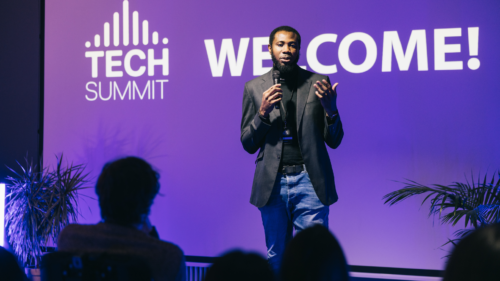As homecoming season at colleges and universities around the country begins, the Biden-Harris Administration announced a remarkable $1.3 billion in additional funding for Historically Black Colleges and Universities (HBCUs), bringing the total federal government support to more than $17 billion. This investment underscores the essential role these institutions play in American society, as well as the unfortunate discriminatory history that has led to funding and resource disparities that still persist today. A product of the Reconstruction era, Black scholars, leaders, students, and professionals were forced to forge their own educational path at HBCUs due to explicit and often violent segregation at predominantly white institutions.
HBCUs have thrived despite these challenges. Receiving 178 times less funding from private philanthropy than Ivy League universities, HBCUs are a beacon of the arts, technical innovation, and civic engagement for Black communities. As Dr. Herman Felton, President of Wiley College, remarked recently, “What would happen if equity and funding partity found our HBCUs?” It’s a challenge we all should seek to answer.
HBCUs play a crucial role in developing the leaders and innovators of tomorrow. HBCU graduates account for:
- 40% of Black members of Congress; 40% of Black engineers, 50% of Black public-school teachers, 50% of Black lawyers, 70% of Black doctors, and 80% of Black state and federal judges.
- 25% of STEM degrees (including technology-related degrees). Of that, 46% of those graduates are women.
- 30% of Black graduates of science and engineering doctorate programs.
And that is exactly what we need with the rapid advent and evolution of generative AI and other digital technologies—we need to empower, invest in, and partner with HBCUs.
Early partnerships and initiatives
Omidyar Network’s mission is to bend the arc of the digital revolution toward shared power, prosperity, and possibility. Digital technology is a powerful and ubiquitous force, which, harnessed wisely, makes wondrous things happen. We believe in working together to intentionally guide tech’s trajectory. Our vision is for our shared humanity to steer our digital future. So far, we have committed more than $1.86 billion to initiatives that share our vision. We engage, partner with, and fund some of the world’s brightest thinkers and innovators to guide our digital future toward the greatest good for the greatest number of people.
We believe that when society diversifies who is making tech, products, investments, and decisions, the rest of the system will shift positively with an injection of new perspectives, considerations, and worldviews. That’s why Omidyar Network recently championed the #BlackTechFutures Research Institute, housed at an HBCU, Stillman College, where they are building robust, sustainable tech systems optimized around Blackness, faith, and justice.
We’ve also built strong partnerships with HBCU consortiums, providing flexible financial support to several schools, including Hampton University, Morehouse College, and Spelman College. We began this journey in 2021 with a grant to Spelman to expand AI ethics research. That same year, Spelman launched The Future is Intersectional: Black Women Interrogating Technology, a series highlighting the unique intersectional lens and contributions that Black women bring to the development and utilization of technology.
We also supported the Mozilla Foundation-led $2.3 million Responsible Computing Challenge. Ten of 15 awards went to HBCUs and minority-serving institutions, further demonstrating that the desire to engage and the technical expertise to compete is more than ready at HBCUs. Awardees of the challenge are exploring topics like biased data sets, AI ethics, and accessible computing. These are subjects of rising importance given that AI models are trained on massive troves of pre-existing data, which often reinforce human bias and could further entrench the disparities in representation we see today. Advocacy for more diverse teams, transparent and explainable models that are open to researchers, and more inclusive datasets for AI training are a must.
Last month, we were honored to co-host a forum with Holland & Knight as a part of the Congressional Black Caucus Foundation’s Annual Legislative Conference. I had the privilege to moderate a discussion on the current landscape of engagement, opportunities, and outcomes as they relate to AI in higher education and equity. There was broad agreement among the educational leaders who joined me that AI will require collective and intentional efforts, investments, and expanded partnerships to ensure we are able to harness AI’s possibilities and prepare for the risks and challenges it could bring.
There is so much energy and so many initiatives growing out of these institutions and, yet, there is still much to be done to contend with the unfortunate industry trends and mounting obstacles to equity. Job rates for women and Black workers in the tech industry have not moved since 2005. Despite the many studies showing more diverse teams outperform their more homogenous counterparts, some tech leaders are increasingly criticizing diversity efforts and even rolling back policies meant to support inclusive and equitable workplaces. We must look critically at who is at the table and hold companies and institutions to account for ensuring a diversity of perspectives and communities are represented in the development and deployment of technology that inevitably impacts us all.
Growing recognition and influence of HBCUs
At Omidyar Network, we recognize that shaping an inclusive AI future requires amplifying diverse voices and perspectives, particularly those who have been historically underrepresented in technological development. HBCUs stand at a pivotal intersection of innovation, education, and community impact, making them uniquely positioned to help create an AI future that truly serves all of humanity. Building on their legacy of excellence and leadership in advancing equity, HBCUs are poised to make transformative contributions across several critical domains.
- Academic excellence and innovation: The recent HBCU AI Research Summit showcased how HBCUs can drive digital innovation. For instance, Morehouse University is pioneering the use of AI teaching assistants. Additionally, the National Science Foundation, under its ExpandAI grant program, awarded AI research grants to Alabama A&M University, Bowie State University, Clark Atlanta University, and Savannah State University. This year, Hopelab, our sister organization within The Omidyar Group, announced its inaugural cohort of HBCU fellows. The program is designed for research faculty and career researchers to translate science into practice to improve Black youth mental health.
- Diversifying the tech workforce: HBCUs are instrumental in shaping the future of technology, producing a significant percentage of Black professionals across various fields. Winston-Salem State University is integrating AI ethics and a social justice context into six interdisciplinary courses to broaden participation in responsible AI. Recently, the U.S. National Science Foundation has awarded $10.5 million for Ideas Lab projects to assess and address research capacity needs, increase access to research facilities, and build human capital at HBCUs.
- Steering tech and shaping policy: The National Institute of Standards and Technology has recognized HBCUs as key players in shaping AI policy through initiatives aimed at responsible AI development. HBCU consortium Atlanta University Center Consortium, an inaugural member of the NIST U.S. AI Safety Institute, has been tasked with operationalizing the President Biden’s Executive Order on AI. This year, Omidyar Network also teamed up with The Policy Academies as it advances racial equity, data science, and economic justice in the public policy sector in partnership with HBCU policy programs.
- Engaging cultural levers and shifting narratives: Digital technologies have a profound impact across industries, democracy, and even how we relate to one another. Artists, storytellers, and producers will undoubtedly shape our perspectives and understanding of AI. Initiatives like the Center for Journalism & Democracy at Howard University aim to foster informed, pro-democracy journalism, which will be critical in fostering an inclusive and factual understanding of AI and its implications on society. Hampton University is home to the world’s first collection of African American fine art, and we consistently see A-list Hollywood producers, directors, writers, and actors, including Samuel L Jackson, acknowledge how their HBCU education prepared them for the multifaceted demands of careers in entertainment.
The future is bright for HBCUs and their role in shaping a more equitable technological landscape. Increased investment and partnership is absolutely necessary so that we may realize the full potential of these institutions. Together, we can ensure that the digital revolution serves the greatest good for the greatest number of people.



